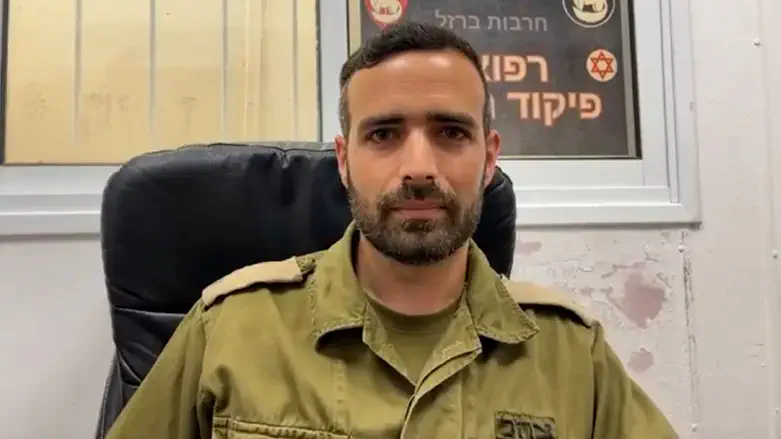
Yakir Ivgi, a combat officer in the Southern Command medical command center, has been mobilized since the beginning of the war, as has his wife, who is herself an officer. He told Arutz Sheva - Israel National News about the tough challenges facing the medical forces in the Gaza area and also about the personal challenge at home where both parents are committed to the war efforts.
Upon his mobilization at the start of the war, his wife was also called back from her maternity leave to her role as an officer in the Border Police.
"On the morning of October 7th, it started with alarms that came out of nowhere and surprised us as well," he says. "Everyone was called to their respective units and we relied on our parents, after some improvisation, to take care of our little daughters, a six-month-old baby and another two and a half years old, which allowed us to focus each on our own tasks."
"Since then, we have been more or less in the same situation. She is in her role and I am still in the reserves. We are constantly seeking time to find the way to do this very important thing," says Yakir. Even as the war stretches into eight months, the parents remain committed: "We need to do this and we will."
Yakir explains his post: "I am responsible for integrating everything happening at the lower levels, divisions, and brigades, and bringing it to our main office, presenting the situation to the commanders and the chief medical officer above us."
Yakir also says that the IDF's medical system has changed since the war began. "Things are changing and improving and are mainly adapted each time to the changing situation. The initiatives come from below, from the field through the medics, paramedics, and doctors in the field, up the chain of command, with the divisions and brigades being responsible for the entire evacuation process."
"It's not easy. We went out more than a few times to hospitals to meet the people. We receive detailed reports on every incident, know what is happening, and indeed sometimes the incidents are very difficult, but we cope and do the best to ensure they get the best treatment in the field and at the hospital."
He also describes how the evacuation of the wounded from Gaza looks, given that the terrain is usually very congested and filled with high-rise buildings. "If we break down the path of the wounded from the moment of injury, within a minute or two a senior medic, either a doctor or a paramedic, arrives, assesses the situation, and evacuates them to the rear. It usually happens with armored vehicles or APCs. We are very diverse in our evacuation capabilities, using heavy equipment, HMMWVs, and even aerial evacuations under fire and in very complicated conditions. From there, the wounded are transported to the hospital."
During the conversation, he recalls the first days of the war: "The reality was utter chaos. Complete ignorance and uncertainty about what was happening on the ground, the number of wounded, their identities, which forces were evacuating, and to where they were evacuating. It took us a few days to get a grip on the situation and start working systematically as we know how to do. But even during the chaos, the teams working on the ground operated exceptionally, provided excellent care, and evacuated despite being under fire. They transported the wounded to hospitals, left them, and returned to the field to evacuate more wounded."
"This is a long war, and I think we are doing our best. We very much hope we will succeed in bringing back the hostages in any way possible, which in my opinion is a noble goal, and of course, we will win this war. As necessary, we will be here to achieve the main goal which is victory over Hamas and the return of the hostages."
Hebrew video:

